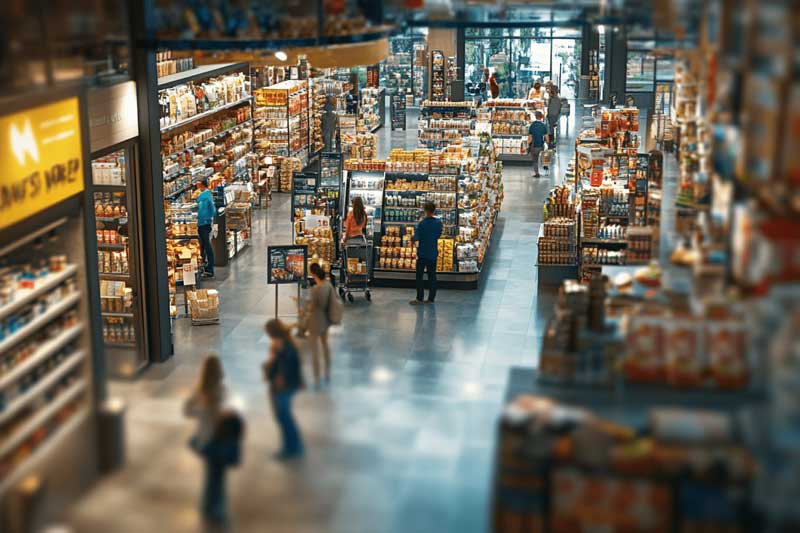Retail has evolved far beyond cash registers and clunky terminals. Today’s consumers expect seamless, secure, and fast payment options across multiple touchpoints — in-store, online, mobile, and even curbside[1]. For retailers looking to meet these expectations, virtual POS systems have become indispensable. These cloud-based platforms replace traditional hardware-heavy setups with flexible, software-driven environments that can process transactions anywhere, anytime.
As the demand for integrated POS management software grows, retailers are rethinking their tech stacks to optimize merchant processing, customer data tracking, and secure credit card processing. In this article, we’ll explore the role of virtual POS systems in reshaping the modern retail experience — from operational efficiency to fraud prevention — and how choosing the right payment POS provider can influence long-term business success.
What Is a Virtual POS System and How Does It Work?
A virtual POS (point-of-sale) system is a cloud-based platform that enables businesses to accept card-not-present or card-present payments without the need for traditional physical terminals. These systems are typically accessed through web browsers or apps and integrate with other tools like inventory platforms, accounting software, and customer relationship management systems[2]. Unlike older systems that require costly hardware and in-store servers, virtual POS platforms offer agility, accessibility, and speed — making them ideal for modern retail environments.
Core Capabilities of Modern Virtual POS Systems
Virtual POS systems go far beyond simple payment acceptance. Their strength lies in their ability to centralize, automate, and secure multiple aspects of retail operations. Below are some of the most critical features that make virtual POS solutions essential in today’s marketplace.
Omnichannel Merchant Processing
Today’s consumers interact with brands across multiple channels. Virtual POS systems support this behavior by enabling businesses to process transactions across in-store, mobile, and ecommerce platforms. By using a unified merchant processing system, businesses can maintain consistent customer experiences and consolidated financial reporting.
Integrated Inventory Management
Leading POS management software includes built-in inventory tools that update stock levels in real time. This feature allows businesses to manage inventory across warehouses, retail locations, and online stores with a single source of truth — reducing stockouts and over-ordering.
Customer Data and Purchase History
Virtual POS systems often include CRM features that track purchase behavior, enabling retailers to offer personalized promotions, build loyalty programs, and segment audiences for targeted marketing. This level of visibility helps retailers respond more quickly to customer preferences and spending trends.
Mobile Payments and Contactless Options
Modern payment POS platforms support mobile wallets and contactless cards, which have surged in popularity post-pandemic. These options not only improve speed at checkout but also reduce physical contact and perceived friction — two factors that heavily influence customer satisfaction.
Remote Access and Cloud Syncing
One of the biggest advantages of virtual POS systems is the ability to access sales, customer, and inventory data from anywhere. With cloud syncing, store managers and owners can monitor real-time performance, update pricing, and manage staff permissions without needing to be physically present.
Enhancing Secure Credit Card Processing in Retail Environments
Security is non-negotiable in payment environments — especially in retail, where breaches can lead to devastating financial and reputational damage[3]. Virtual POS systems are designed to prioritize secure credit card processing through advanced encryption protocols, tokenization, and compliance integrations that reduce vulnerability.
Secure Credit Card Processing Enhancements
End-to-End Encryption (E2EE)
Data encryption from the moment a card is swiped or keyed in ensures that payment information is never exposed in plaintext. This security measure is critical for preventing data theft during transmission and at rest.
Tokenization for Stored Payment Data
Instead of storing sensitive cardholder information, virtual POS systems replace it with unique tokens. These tokens are useless to hackers, minimizing the risk associated with recurring payments, loyalty programs, and stored cards.
PCI DSS Compliance
Any platform that processes payments must meet PCI DSS standards. The best virtual POS systems are fully certified and offer tools that help merchants stay compliant with minimum effort — including breach detection and audit support.
Fraud Detection and Risk Scoring
Integrated fraud detection systems flag unusual patterns, such as high-risk transactions, mismatched billing data, or IP inconsistencies. These tools help reduce chargebacks and fraudulent activity without inconveniencing legitimate customers.
Two-Factor Authentication for Staff Logins
Secure systems go beyond customer-facing protection. Enforcing two-factor authentication and user-specific permissions ensures that internal threats and employee fraud are minimized, particularly for high-value transactions or refunds.

Adapting to Consumer Preferences with Flexible Payment POS Technology
Shoppers today expect diverse options for both purchases and payments, prompting retailers to enhance their checkout processes. Virtual POS systems lead this change by offering flexible flows and supporting various payment types[4]. They enable faster transaction approvals, crucial for a quick shopping experience. By streamlining payment and reducing checkout friction, retailers improve customer satisfaction, foster loyalty, and increase conversion rates, maximizing sales opportunities. As the landscape of retail continues to evolve, embracing such technologies becomes essential for businesses looking to stay competitive and meet the expectations of modern consumers. In summary, the integration of virtual POS systems represents a strategic move that benefits both retailers and shoppers alike.
The Role of POS Management Software in Operational Efficiency
Retailers often underestimate how much time is wasted on manual tasks like reconciling registers, checking inventory, or managing staff schedules. Virtual POS systems automate many of these processes through smart scheduling, sales analytics, and centralized dashboards.
With unified reporting and real-time performance monitoring, managers can make informed decisions without needing to manually compile data from different departments or systems. This consolidation improves productivity and lowers overhead by eliminating redundant workflows.
Multi-Store Management and Franchise Scalability
For growing brands or franchises, scaling payment infrastructure can be a nightmare without the right systems in place. Virtual POS platforms simplify this process by supporting multi-location setups under a single interface. Centralized control over pricing, promotions, and staff permissions helps maintain brand consistency and financial oversight. Scalability also means integrating with broader business ecosystems — like ERP software, ecommerce platforms, or third-party delivery apps. The ability to add new stores or regions without reengineering the payment system ensures smoother expansion and fewer operational headaches.
Using Data from Virtual POS to Improve Customer Experience
Every transaction creates valuable data that, when analyzed, reveals customer habits, product performance, and seasonal trends. Virtual POS systems collect this data at every touchpoint, helping retailers forecast demand, optimize store layouts, and train staff to handle high-traffic times more effectively. Retailers that use this information to refine customer interactions — such as personalized offers or follow-up emails after in-store visits — see increased loyalty and higher lifetime customer value. Over time, POS data can evolve into one of the most powerful assets in a retailer’s marketing toolkit.
Selecting the Right Virtual POS Provider for Your Business
Choosing a virtual POS system isn’t just a technical decision — it’s a strategic one. Retailers should evaluate providers based on their ability to support secure credit card processing, integrate with essential tools, and offer the flexibility needed for future growth. The ideal partner understands your industry, supports compliance, and offers ongoing support beyond the initial setup. It’s also critical to work with a provider that offers transparent pricing, responsive service, and scalable infrastructure. As customer demands and regulatory expectations evolve, your virtual POS system must be agile enough to adapt without forcing major reinvestments or migrations.
Conclusion
Virtual POS systems have become essential tools for retailers seeking agility, visibility, and control in today’s competitive environment. More than just a modern checkout solution, they serve as the backbone for merchant processing, inventory tracking, customer engagement, and operational management[5]. By consolidating multiple functions into a single platform, virtual POS solutions help businesses streamline operations, reduce fraud, and deliver seamless shopping experiences across every channel.
Payment Nerds provides secure, scalable payment POS systems and POS management software for retailers ready to modernize their operations. Whether you’re managing a single storefront or a multi-location retail chain, our solutions support secure credit card processing, real-time reporting, and the flexibility you need to meet evolving customer expectations. From payment infrastructure to merchant processing strategy, Payment Nerds is your trusted partner for retail innovation.
Sources
- Federal Trade Commission. “Consumer Payment Trends and Retail Technology.” Accessed March 2025.
- Forbes. “The Shift to Cloud-Based POS in Retail.” Accessed March 2025.
- PCI Security Standards Council. “Understanding POS System Security.” Accessed March 2025.
- MIT Technology Review. “The Role of Virtual POS Systems in Modern Retail Environments.” Accessed March 2025.
- U.S. Chamber of Commerce. “How Small Businesses Benefit from Mobile POS Systems.” Accessed March 2025.











